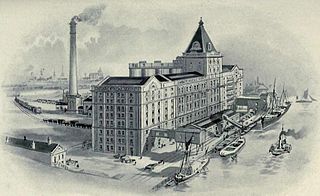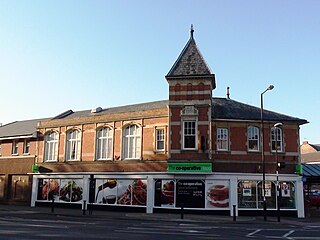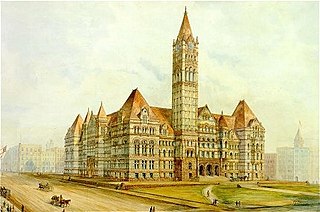Related Research Articles
In economics, a free market is a system in which the prices for goods and services are self-regulated by buyers and sellers negotiating in an open market without market coercions. In a free market, the laws and forces of supply and demand are free from any intervention by a government or other authority other than those interventions which are made to prohibit market coercions. Examples of such prohibited market coercions include: economic privilege, monopolies, and artificial scarcities. Proponents of the concept of free market contrast it with a regulated market in which a government intervenes in the exchange of property for any reason other than reducing market coercions.
Participatory economics, often abbreviated Parecon, is an economic system based on participatory decision making as the primary economic mechanism for allocation in society. In the system, the say in decision-making is proportional to the impact on a person or group of people. Participatory economics is a form of socialist decentralized planned economy involving the common ownership of the means of production. It is a proposed alternative to contemporary capitalism and centralized planning. This economic model is primarily associated with political theorist Michael Albert and economist Robin Hahnel, who describes participatory economics as an anarchist economic vision.

A cooperative is "an autonomous association of persons united voluntarily to meet their common economic, social and cultural needs and aspirations through a jointly owned and democratically-controlled enterprise". Cooperatives are democratically owned by their members, with each member having one vote in electing the board of directors. Cooperatives may include:

State ownership, also called government ownership and public ownership, is the ownership of an industry, asset, or enterprise by the state or a public body representing a community, as opposed to an individual or private party. Public ownership specifically refers to industries selling goods and services to consumers and differs from public goods and government services financed out of a government's general budget. Public ownership can take place at the national, regional, local, or municipal levels of government; or can refer to non-governmental public ownership vested in autonomous public enterprises. Public ownership is one of the three major forms of property ownership, differentiated from private, collective/cooperative, and common ownership.

The Rochdale Principles are a set of ideals for the operation of cooperatives. They were first set out in 1844 by the Rochdale Society of Equitable Pioneers in Rochdale, England and have formed the basis for the principles on which co-operatives around the world continue to operate. The implications of the Rochdale Principles are a focus of study in co-operative economics. The original Rochdale Principles were officially adopted by the International Co-operative Alliance (ICA) in 1937 as the Rochdale Principles of Co-operation. Updated versions of the principles were adopted by the ICA in 1966 as the Co-operative Principles and in 1995 as part of the Statement on the Co-operative Identity.
Anarchist "economics" is the set of theories and practices of economic activity within the political philosophy of anarchism. Many anarchists are anti-authoritarian anti-capitalists, with anarchism usually referred to as a form of libertarian socialism, i.e. a stateless system of socialism. Anarchists support personal property and oppose capital concentration, interest, monopoly, private ownership of productive property such as the means of production, profit, rent, usury and wage slavery which are viewed as inherent to capitalism.

The Mondragon Corporation is a corporation and federation of worker cooperatives based in the Basque region of Spain.

A co-operative wholesale society, or CWS, is a form of co-operative federation, in this case, the members are usually consumer cooperatives. According to co-operative economist Charles Gide, the aim of a co-operative wholesale society is to arrange “bulk purchases, and, if possible, organise production.” In other words, a co-operative wholesale society is a form of federal co-operative through which consumers co-operatives can collectively purchase goods at wholesale prices, and in some cases collectively own factories or farms.
A worker cooperative is a cooperative owned and self-managed by its workers. This control may mean a firm where every worker-owner participates in decision-making in a democratic fashion, or it may refer to one in which management is elected by every worker-owner who each have one vote.
Common ownership refers to holding the assets of an organization, enterprise or community indivisibly rather than in the names of the individual members or groups of members as common property.

A consumers' co-operative is an enterprise owned by consumers and managed democratically and that aims at fulfilling the needs and aspirations of its members. Such co-operatives operate within the market system, independently of the state, as a form of mutual aid, oriented toward service rather than pecuniary profit. Consumers' cooperatives often take the form of retail outlets owned and operated by their consumers, such as food co-ops. However, there are many types of consumers' cooperatives, operating in areas such as health care, insurance, housing, utilities and personal finance.

Charles Gide was a French economist and historian of economic thought. He was a professor at the University of Bordeaux, at Montpellier, at Université de Paris and finally at Collège de France. His nephew was the author André Gide.

Cooperative economics is a field of economics that incorporates cooperative studies and political economy toward the study and management of cooperatives.
The history of the cooperative movement concerns the origins and history of cooperatives across the world. Although cooperative arrangements, such as mutual insurance, and principles of cooperation existed long before, the cooperative movement began with the application of cooperative principles to business organization.
The social dividend is the return on the capital assets and natural resources owned by society in a socialist economy. The concept notably appears as a key characteristic of market socialism, where it takes the form of a dividend payment to each citizen derived from the property income generated by publicly owned enterprises, representing the individual's share of the capital and natural resources owned by society.

The Farmers’ Storehouse was Canada's first farmers' cooperative, founded in Toronto and the Home District in 1824. It stood at the centre of a broad economic and political reform movement that, in its essentials, was not greatly different from contemporary movements such as the Owenite socialists in Britain, as well as much later cooperative movements such as the United Farmers of Alberta in the early twentieth century.
Economic democracy is a socioeconomic philosophy that proposes to shift decision-making power from corporate managers and corporate shareholders to a larger group of public stakeholders that includes workers, customers, suppliers, neighbours and the broader public. No single definition or approach encompasses economic democracy, but most proponents claim that modern property relations externalize costs, subordinate the general well-being to private profit and deny the polity a democratic voice in economic policy decisions. In addition to these moral concerns, economic democracy makes practical claims, such as that it can compensate for capitalism's inherent effective demand gap.
Social ownership is the appropriation of the surplus product, produced by the means of production, to society as a whole. It is the defining characteristic of a socialist economic system. It can take the form of community ownership, state ownership, common ownership, employee ownership, cooperative ownership, and citizen ownership of equity. Traditionally, social ownership implied that capital and factor markets would cease to exist under the assumption that market exchanges within the production process would be made redundant if capital goods were owned and integrated by a single entity or network of entities representing society; but the articulation of models of market socialism where factor markets are utilized for allocating capital goods between socially owned enterprises broadened the definition to include autonomous entities within a market economy. Social ownership of the means of production is the common defining characteristic of all the various forms of socialism.

Market socialism is a type of economic system involving the public, cooperative, or social ownership of the means of production in the framework of a market economy, or one that contains a mix of worker-owned, nationalized, and privately owned enterprises. The central idea is that, as in capitalism, businesses compete for profits, however they will be "owned, or at least governed," by those who work in them. Market socialism differs from non-market socialism in that the market mechanism is utilized for the allocation of capital goods and the means of production. Depending on the specific model of market socialism, profits generated by socially owned firms may variously be used to directly remunerate employees, accrue to society at large as the source of public finance, or be distributed amongst the population in a social dividend.
Socialist economics comprises the economic theories, practices and norms of hypothetical and existing socialist economic systems. A socialist economic system is characterized by social ownership and operation of the means of production that may take the form of autonomous cooperatives or direct public ownership wherein production is carried out directly for use rather than for profit. Socialist systems that utilize markets for allocating capital goods and factors of production among economic units are designated market socialism. When planning is utilized, the economic system is designated as a socialist planned economy. Non-market forms of socialism usually include a system of accounting based on calculation-in-kind to value resources and goods.
References
- ↑ Gide, Charles; as translated from French by the Co-operative Reference Library, Dublin, "Consumers' Co-Operative Societies", Manchester: The Co-Operative Union Limited, 1921
- ↑ Lambert, Paul; as translated by Létarges, Joseph; and Flanagan, D.; “Studies in the Social Philosophy of Co-operation”, (originally published March 1959), Manchester: Co-operative Union, Ltd., 1963.
- ↑ Potter, Beatrice, "The Co-operative Movement in Great Britain", London: Swan Sonnenschein & Co., 1891.
- ↑ Lewis, p. 244.
- ↑ This analysis is based on a discussion by Gide, Charles; as translated from French by the Co-operative Reference Library, Dublin, "Consumers' Co-Operative Societies", Manchester: The Co-Operative Union Limited, 1921, pp. 192-203.
- ↑ This analysis is based on a discussion by Gide, Charles, pp. 192-203.